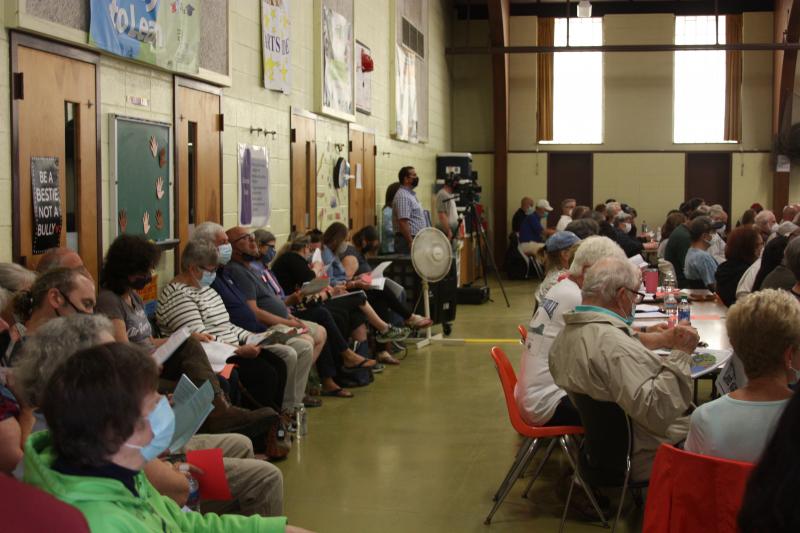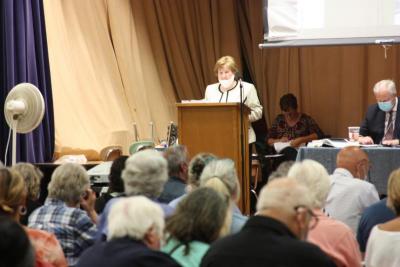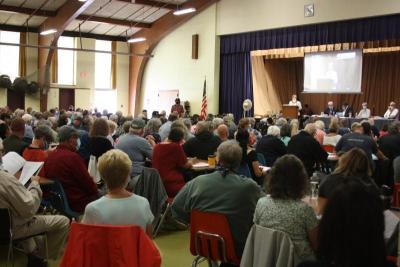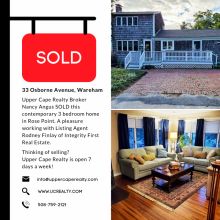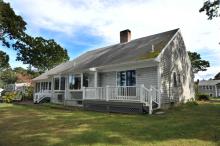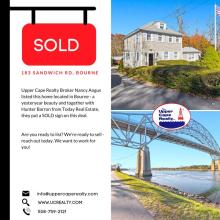Marathon town meeting names school, bans nips, limits solar
As the sun moved across the sky and late morning turned into the late afternoon, intrepid voters in the Decas School cafeteria managed to conquer a 43-item Town Meeting warrant and pass a $61.7 million town budget, guided by Town Moderator Claire Smith.
The June 12 meeting, which lasted more than five and a half hours, was especially lengthy because the spring and fall town meetings in 2020 were abbreviated to only necessary financial articles to keep meetings short during the height of the pandemic.
School name
The new school in progress on Minot Avenue will be named the Wareham Elementary School.
Because the Board of Selectmen eventually agreed with the petitioners’ argument that naming the wings of the school in honor of the Minot family and John W. Decas would be a sufficient tribute, the article was approved unanimously without much discussion.
Restricting future solar projects
As part of an effort to curtail the recent influx of solar projects, a citizens’ petition limiting the size and location of new solar fields was passed by voters.
The bylaw, spearheaded by Nancy McHale of the Wareham Land Trust, restricts new fields to between 3 and 10 acres in size, and requires them to be placed on land that has been cleared of trees for at least five years. McHale explained that the bylaw was designed to act as a sort of stop-gap to curb solar projects until the town can update its existing solar bylaw, which she said is outdated.
“The adoption of this amendment will pause the development of future large projects, allowing time to evaluate the new state guidance and revise the entire bylaw,” McHale said.
She explained that federal and state agencies had issued new guidance regarding solar projects since Wareham’s original solar bylaws were written.
“If we have any hope of preserving Wareham’s neighborhoods, forests and farmlands for future generations, we must incorporate the new guidance from the feds and the state agencies, as well as conservation groups like MassAudubon,” McHale said. “Solar energy is great, but pitting forest and solar against each other is bad policy.”
The bylaw, which required a two-thirds majority vote to pass, was approved unanimously.
The approval of this bylaw will not impact the nine solar fields that have been proposed in recent months, as those applicants filed preliminary subdivision plans that protect their projects from new zoning laws.
Borrego PILOT agreements
After some heated debate, voters ultimately approved a solar Payment in Lieu of Taxes (PILOT) agreement with Borrego for the company’s proposed solar fields at 140 Tihonet Rd., 150 Tihonet Rd. and 27 Charge Pond Rd.
The agreement is the town’s way of arranging a required payment plan with a solar company — ensuring the town will know what to expect for tax revenue, and that the solar company will understand its future burden.
The approval of the PILOT agreement does not affect when or if the solar projects, which are currently the subject of a lawsuit, can be built. The article was debated primarily by voters who feared that approving the PILOT agreement would signal that voters approved of the solar projects.
PILOT agreements are necessary because the state’s current laws don’t provide a structure for solar farms to be taxed in the same manner as many other properties and businesses. There are currently efforts at the state level to create a system to tax solar farms.
An article that would have paved the way for the town to create a commercial solar/wind taxation home rule — which would ensure that all future solar and wind projects in town are taxable — was passed over. The article may be revisited at a future Town Meeting, but officials want to make sure they understand the implications of the state’s new solar tax structure before passing such a bylaw.
Nip ban
A majority of voters approved a ban on the sale of miniature liquor bottles.
Several voters emphasized the pervasiveness of nip bottles littered around town when speaking in support of the ban.
“On May 21st, I walked from The Narrows restaurant to Indian Neck road, and, just on one side of the road, [...] I counted 146 nips,” said DJ Wilson. “Most likely, the people who threw these nips out of their car were actually driving the car. So it’s a public safety issue.”
Some opponents argued that people would simply purchase the small bottles, commonly called “nips,” in other towns or would litter larger bottles instead. Selectman Alan Slavin described the ban as a stop-gap and said the only real solution to the litter problem would be a deposit on the small bottles — such a law is in progress at the state level.
“If we put a deposit on [nips], it will fix the problem,” said Wareham resident Jess Ellis. “You don’t see aluminum cans [on the streets].” She added that she lives on Onset Avenue and regularly picks up littered nip bottles.
Slavin added that he expected other towns would follow Wareham’s lead in passing a nip ban, as several towns, including Falmouth, have already done.
Wetland bylaws
Voters passed two contentious amendments to the town’s wetland bylaws.
One would make it easier for the town to do routine work such as “replacement, repair and maintenance of existing Town roadways, facilities, installations and fixtures.” Previously, the town occasionally had to seek permits for repairs from the Conservation Commission, which sometimes slowed or prevented routine maintenance work such as cleanup of the Bluffs in Onset.
“I completely understand that Municipal Maintenance has a very limited staff, and we are hamstringing them by forcing them to go to the Conservation Commission every time they — or the Harbor Master’s office — wants to provide prudent maintenance of our town facilities,” said Neal Sullivan, who lives in Onset. “I’ll give you one example: If you drive up to the municipal bluffs area in Onset, there are a multitude of trees that are virtually dead. Mr. Menard right now cannot cut down any of those trees unless he goes before our Conservation department.”
The bylaw changed passed with a majority vote.
The second change grants private developers a similar exemption: It removed the 50-foot no work zone along the waterfront from the British Landing condos to Tremont Nail, for projects that include a water-dependent use and are being built in previously disturbed areas.
At previous meetings, officials explained that the change was designed to make downtown Wareham more attractive to developers. Wealthy businessman and Wareham native Danny Warren’s plans for a marina and restaurant at the old Greer Lumber site downtown were repeatedly mentioned in the discussion before voters approved the bylaw change.
Conservation Commission Chair Sandy Slavin expressed concern, saying that the town has no idea what projects might pop up along that stretch of land and that the Conservation Commission already has the authority to waive the no-work zone.
Funding for Littleton Drive
Voters did not approve an $830,000 grant to Pennrose, the developers behind the affordable housing development at Littleton Drive. Those who spoke against the funding argued that approving the funds for affordable housing projects would eat through the town’s Community Preservation funding, and said that the town shouldn’t be subsidizing Pennrose, a for-profit company. Some feared the approval would set a precedent, and the town would be beholden to fund similar projects in the future — although each would require a town meeting vote.
Per state law, the town is required to set aside 10 percent of Community Preservation Funds for affordable housing, plus 10 percent each for historic preservation, open space, and recreation.
Town Planner Ken Buckland said that the funding would not impact the developer’s bottom line, and it would go to amenities like a community center and walking trails that would be open to everyone in town.
The funding was not approved.
Affordable Housing citizens petition
A citizens petition authored by former Selectwoman Brenda Eckstrom that would encourage the development of affordable housing units through the conversion of existing in-law and illegal apartments and allowing the subdivision of lots in some neighborhoods was passed after a fair amount of discussion.
Each added unit through the program would count toward the town’s affordable housing stock, with the goal that the town could meet the state-set 10 percent threshold that allows the town to turn down large 40B housing developments.
Both the Board of Selectmen and Planning Board recommended the article’s passage.
“I’ve been a proponent of affordable housing for many years, but I’m not a fan of 40B [...] because it essentially hands over a town’s control to developers,” Eckstrom said. She explained that she designed the law to maintain the “character and charm” of Wareham by creating affordable options other than large apartment complexes.
Jacqui Nichols of the assessing department said that she was concerned the bylaw had inconsistencies that would cause it to be vetoed by the state’s Attorney General, and said the law would create a burden on the town’s administrative staff. Eckstrom said the bylaw had been vetted by the town’s attorney.
Although others raised similar concerns about the logistics of the bylaw, it was approved by a simple majority of voters.
Cannabis lab set-back
Town Meeting approved a zoning change that will allow Smithers Lab to test up to eight teaspoons of marijuana products a day for metals or chemicals. The prior zoning had not allowed for this due to the lab’s proximity to the Decas Elementary School, which is set to close at the end of 2021.
Cannabis testing can now begin before the school closes.
Changes to Town Charter
Proposed changes to the Town Charter — a legal document that outlines the structure of Wareham’s government and delineates the powers and duties of various committees and officials — proved controversial.
The more substantive changes to the charter prompted debate and amendments. After much debate, voters approved making the Town Clerk an appointed position. Although some did not want to relinquish an elected position, others argued that it was a necessary change to ensure that only qualified and trained individuals serve as clerk.
“Town Clerk, as [the charter] is written now, doesn’t even have to show up for work,” said Patty Neal, who works in town administration. “The presidential election that we just had with all of the electronic and mail-in voting is not something that someone just coming in off the street can do. We need the qualifications.”
Voters chose not to dissolve the Board of Road Commissioners. Voters also approved making the Sewer Superintendent a position appointed by the Town Administrator rather than by the Board of Sewer Commissioners.
Changes to the grammar and structure of the charter — all of which are intended to make the charter easier to read and understand — passed without much discussion. The changes renaming the Board of Selectmen the Select Board — a gender-neutral alternative. The name change was not explicitly discussed until after the vote was taken.
Master Plan
Voters endorsed the 2020 Wareham Master Plan, which is a document that addresses the town’s goals for land use, housing, climate change, and economic development, etc. Having the master plan in place means town officials can work from a shared vision for the community. The plan also makes the town eligible for certain state grants.
Town budget, capital plan
The vote on the town’s $61,665,718 budget was initially stymied by an inconsistency between the budget as prepared by town officials and as it was printed in the handout distributed to voters. At least one line item had an incorrect amount, leading to confusion about how the budget could be approved — an especially urgent issue due to the impending end of the fiscal year at the end of this month.
Although it took about 20 minutes, Town Administrator Derek Sullivan and IT were able to get his copy of the correct budget projected on the screen for voters to review — garnering a smattering of applause. The budget itself prompted little discussion and was passed by a majority of voters.
The town’s $967,358 Capital Plan was also approved. The town will purchase several new vehicles, including a dedicated truck for animal control, a dump truck and a vactor vacuum truck.
Marijuana delivery
Voters approved limiting the number of marijuana delivery operators, who would operate a business without a traditional storefront, in town to three. There is no limit on the number of marijuana courier licenses, which are tied to a retail store and work more like pizza delivery.
Other articles
A measure that would allow drive-thrus as a by-right use in the commercial strip district, which stretches along most of Cranberry Highway, was voted down.
Voters approved amending the definition of duplexes and multi-family homes to clarify that adjoining dwellings must share a wall.
In total, seven new liquor licenses were created at Town Meeting. Two licenses are for 59 Main St. and 176 Main St., locations downtown that Warren hopes to develop, while five are for the Wareham Village district, which the selectmen have designated an area in need of economic stimulus.
Voters also approved a number of routine financial articles, including the Onset Parking Program, budget transfers, and PEG Access Receipts, which fund WCTV.
An article that would rezone Wareham Village to promote economic redevelopment was directed to further study and will be brought for a vote at a future town meeting.
The town will be updating its FEMA floodplain maps after a positive vote from Town Meeting attendees. Updating the maps was necessary to ensure residents are able to purchase and maintain flood insurance for their properties.
This story has been updated to include additional explanation and discussion of some articles.



